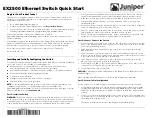
Chapter 3 Web User Interface
This section describes how to access the device via the web user interface using
an Internet browser such as Microsoft Internet Explorer (version 5.0 and later).
3.1 Default Settings
The following are the default settings for the device.
•
•
•
•
•
•
•
•
•
•
•
•
•
Local (LAN) access (username:
root
, password:
12345
)
Remote (WAN) access (username:
support
, password:
support
)
User access (username:
user
, password:
user
)
LAN IP address: 192.168.1.1
WAN IP address: none
Remote WAN access:
disabled
DHCP server:
enabled
in routing modes (PPPoA/E, IPoA & MER)
Firewall and NAT:
enabled
for PPPoE and PPPoA
disabled
for Bridge*, MER and IPoA
* NAT is not available in Bridge mode
This device supports the following connection types.
PPP over Ethernet (PPPoE)
PPP over ATM (PPPoA)
MAC Encapsulated Routing (MER)
IP over ATM (IPoA)
Bridging
Technical Note:
During power on, the device initializes all settings to default values. It will then
read the configuration profile from the permanent storage section of flash
memory. The default attributes are overwritten when identical attributes with
different values are configured. The configuration profile in permanent storage
can be created via the web user interface or telnet user interface, or other
management protocols. The factory default configuration can be restored either
by pushing the reset button for more than five seconds until the power indicates
LED blinking or by clicking the Restore Default Configuration option in the Restore
Settings screen.
3.2 IP Configuration
DHCP Mode
When the device powers up, the DHCP server (on the device) will start
automatically. To set your PC for DHCP mode, check the Internet Protocol
properties of your Local Area Connection. You can set your PC to DHCP mode by
selecting
Obtain an IP address automatically
in the dialog box shown below.
15
Summary of Contents for CT-5611E
Page 1: ...CT 5611E ADSL2 Combo Router for Annex B User Manual Version A1 0 June 2 2008 261070 009...
Page 14: ...13...
Page 41: ...40...
















































